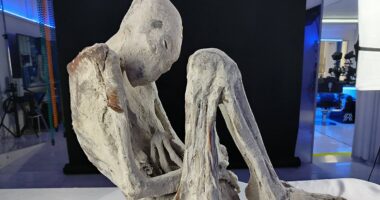The case against Mahmoud Khalil, a Columbia University student activist facing deportation, may be terminated by an immigration judge in Louisiana if the government fails to provide evidence this week to support their decision.
Judge Jamee Comans presided over a hearing where she gave the government a 24-hour deadline to present proof that justifies Khalil’s expulsion from the United States due to his involvement in campus protests against Israel and the war in Gaza. Should the evidence be insufficient, Comans stated that she would close the case on Friday.
Following his arrest on March 8 by immigration authorities, Khalil, a 30-year-old legal permanent resident, has been detained in Jena, Louisiana. His situation is part of a larger pattern where foreign-born students engaged in pro-Palestinian demonstrations or voiced criticisms against Israel face deportation attempts.
While the Trump administration has suggested that Khalil’s role as a spokesperson for protesters proved that he was “aligned with Hamas,” they have yet to produce evidence for the claim.
At Tuesday’s hearing, an attorney for Khalil, Marc Van Der Hout, said he had “not received a single document” in response to his request for “evidence and assertions” in the case. “We cannot plead until we know what the specific allegations are,” Van Der Hout said.
“I’m like you Mr. Van Der Hout, I’d like to see the evidence,” the judge replied.
In a statement released several hours after the hearing, Van Der Hout criticized the timeline, arguing again that the government hasn’t produced “a single shred of evidence” to support its allegations.
“Yet the Immigration judge today stated she intends to rule Friday on the merits of this outlandish charge with no realistic opportunity for Mahmoud and his lawyers to contest this baseless charge,” Van Der Hout said in the statement. “If this turns out to be what happens Friday, it would be an uncalled-for rush to judgement that would completely deprive Mahmoud of any due process, which is a foundation of our legal system.”
Khalil, who wore a navy-blue T-shirt over a beige sweatshirt, spoke only briefly to request that his wife be permitted remote access to the hearing.
The judge obliged, noting that more than 600 people were awaiting access to the proceeding in a virtual lobby. “This is highly unusual,” Comans said.
Khalil’s detention has sparked fury among free speech advocates, who accuse the Trump administration of seeking to squelch criticism of Israel by labeling peaceful activists as terror-supporters.
Khalil, an international affairs graduate student, served as a negotiator and spokesperson for student protesters at Columbia, but was not among those arrested and has not been accused of any crime.
In seeking to deport Khalil and other student activists, the Trump administration has relied on a rarely-used statute that authorizes the Secretary of State to expel noncitizens who pose “potentially serious adverse foreign policy consequences for the United States.”
They have alleged, without offering evidence, that Khalil’s prominent role in anti-Israel protests amounted to support for Hamas, the militant group that controls Gaza and attacked Israel in October 2023.
Khalil and others involved in the protests have repeatedly denied claims of antisemitism.
In a letter dictated from jail last month, Khalil said his detention was a “direct consequence of exercising my right to free speech as I advocated for a free Palestine and an end to the genocide in Gaza.”
As Khalil’s immigration case plays out in Louisiana, his attorneys have also challenged his detention and potential deportation before a federal judge in New Jersey.
That judge last week rejected the Trump administration’s effort to transfer jurisdiction of the legal battle to Louisiana, but has yet to rule on the petition for his release.
Copyright © 2025 by The Associated Press. All Rights Reserved.

















